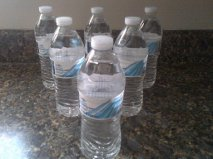Health & Nutritional Tips
NOTE: Long-Term recovery from exercise is best achieved with proper Nutritional intake!
10 Great Snacks Before Bed
The secret to getting a solid 7 plus hours of sleep. About 1 hour before you want to hit the sack, head for the kitchen and make yourself a evening snack. Keep it light (around 200 calories), so you don’t overload your digestive system. I highly suggest one of the items of foods listed below.
1. Bananas — They’re practically a sleeping pill in a peel. In addition to a bit of soothing melatonin and serotonin, bananas contain magnesium, a muscle relaxant.
2. Turkey — It’s the best-known source of tryptophan, credited with all those Thanksgiving naps. But that’s actually modern 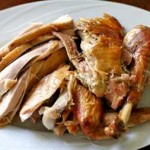 folklore. Tryptophan works when your stomach’s basically empty rather than overstuffed and when there are some carbs around rather than tons of protein. But put a lean slice or two on some whole-wheat bread midevening and you’ve got one of the best sleep-inducers in your kitchen.
folklore. Tryptophan works when your stomach’s basically empty rather than overstuffed and when there are some carbs around rather than tons of protein. But put a lean slice or two on some whole-wheat bread midevening and you’ve got one of the best sleep-inducers in your kitchen.
3. Warm milk — It’s not a myth. Milk has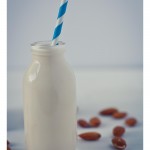 some tryptophan, an amino acid that has a sedative-like effect, and calcium, which helps the brain use tryptophan. Plus, there’s the psychological throwback to infancy, when a warm bottle meant “relax, everything’s fine.
some tryptophan, an amino acid that has a sedative-like effect, and calcium, which helps the brain use tryptophan. Plus, there’s the psychological throwback to infancy, when a warm bottle meant “relax, everything’s fine.
4. Almonds — A handful of these heart-healthy nuts can send you snoozing because they contain both tryptophan and a nice dose of muscle-relaxing magnesium.
5. Potatoes — A small baked spud won’t overwhelm your gastrointestinal tract as it clears away acids that can interfere with yawn-inducing tryptophan. To up the soothing effect, mash the potato with warm milk.
6. Chamomile tea — Chamomile is a staple of bedtime tea blends because of its mild sedating effect, which makes it the perfect natural antidote for restless minds and bodies.
7. Honey — Drizzle a little in your warm milk or herb tea. Lots of sugar is stimulating, but a little glucose tells your brain to turn off orexin, a recently discovered neurotransmitter that’s linked to alertness.
8. Oatmeal — Oats are a rich source of sleep-inviting melatonin, and a small bowl of warm cereal with a splash of maple syrup is cozy — and if you’ve got the munchies, it’s filling, too.
9. Flaxseeds — When life goes awry, and feeling down is keeping you up, try sprinkling 2 tablespoons of these healthy little seeds on your bedtime oatmeal. They’re rich in omega-3 fatty acids, a natural mood lifter.
10. Whole-wheat bread — A slice of toast with your tea and honey will release insulin, which helps tryptophan get to your brain, where it’s converted to serotonin and quietly murmurs “time to sleep.”
Drink lots of Water
One thing everyone agrees on is that regardless of your diet, regardless of your goals, you should be drinking a great deal of water.
Water makes up 60-70 percent of your body weight (70-75% of your muscle weight) and plays a vital role not only in maintaining good health, but in your ability to build muscle.
Unfortunately, few coaches and trainers understand how important water is to their goals. Water is a transport for all types of nutrients and minerals.
What good will it do if you put great things into your body but don’t provide it with a way to distribute those nutrients to your muscles?
How Much Water?
The standard recommendation is that everyone should get 64 oz. of water a day. On a high protein diet and participating in an intense weight training program you should try and get even more.
A good goal to aim for is one eight-ounce glass of water for every 10-12.5 lbs. of bodyweight.
So, if you weigh 150 lbs., you should be drinking 12-15 glasses of water a day (150/12.5 = 12, 150/10 = 15). The best way to get to your water intake goals is by starting the day off with a glass of water immediately upon waking. From there, continuously sipping rather than gulping every once in a while is the best course to take.
Breakfast
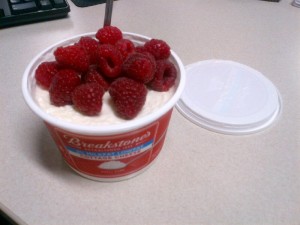 Other than the huge glass of water and banana I eat on the way to work at 5am. This is the way I like to start off my day. I feel 2% cottage cheese and fruit is a great source of protein and carbs. I probably eat this too often (5 days a week) but I like what I like and I am one consistent dude. My variety in life is the seasonal fruit.
Other than the huge glass of water and banana I eat on the way to work at 5am. This is the way I like to start off my day. I feel 2% cottage cheese and fruit is a great source of protein and carbs. I probably eat this too often (5 days a week) but I like what I like and I am one consistent dude. My variety in life is the seasonal fruit.
Great Mid-Morning Snacks
 Cuties are made up of two types of Mandarin Oranges: Clementine Mandarins and W. Murcott oranges and loaded with Vitimen C. Cuties have risen to popularity due to its sweet taste, easy to peel skin and its seedless characteristics
Cuties are made up of two types of Mandarin Oranges: Clementine Mandarins and W. Murcott oranges and loaded with Vitimen C. Cuties have risen to popularity due to its sweet taste, easy to peel skin and its seedless characteristics
They are available at major grocery stores to buy in bulk. This way you will always have them at any time for a healthy and nutritious snack!
Weight Gain
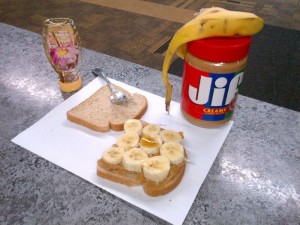 Coaches, this is another great thing to eat during the day if you are looking to get strong and pack on the pounds. It is a peanut butter, honey, & banana sandwich. I got this brilliant idea from legendary high school Strength & Speed coach Mike Srock of Byrnes High School. Byrnes High is located in Duncan, South Carolina and they have won numerous 4A state championships in Football in the last 13 years. He strongly recommends his players eat a few of these sandwiches a day to gain weight. I have seen a tripledecker sandwich pounded in just minutes by one of our past interns Ryan Waterbury. I have always wondered how many calories he took in during that one sitting. I recommend eating two sandwiches a day for young athletes, one at 10am and the other at 2pm. This will give them the energy they need to compete.
Coaches, this is another great thing to eat during the day if you are looking to get strong and pack on the pounds. It is a peanut butter, honey, & banana sandwich. I got this brilliant idea from legendary high school Strength & Speed coach Mike Srock of Byrnes High School. Byrnes High is located in Duncan, South Carolina and they have won numerous 4A state championships in Football in the last 13 years. He strongly recommends his players eat a few of these sandwiches a day to gain weight. I have seen a tripledecker sandwich pounded in just minutes by one of our past interns Ryan Waterbury. I have always wondered how many calories he took in during that one sitting. I recommend eating two sandwiches a day for young athletes, one at 10am and the other at 2pm. This will give them the energy they need to compete.
Plan your Meals
 Take a movement every week and plan your meals. Once you put together a plan then prepare it. The best way to do this is to cook all your chicken at one time and put it in containers and with your veggies you can chop them up into appropriate portion sizes and place them in containers as well. If you are prepared for the week then you will be less likely to go long periods of time without eating and less likely to eat unnecessary JUNK and unneeded calories.
Take a movement every week and plan your meals. Once you put together a plan then prepare it. The best way to do this is to cook all your chicken at one time and put it in containers and with your veggies you can chop them up into appropriate portion sizes and place them in containers as well. If you are prepared for the week then you will be less likely to go long periods of time without eating and less likely to eat unnecessary JUNK and unneeded calories.
Eat 6 times a day
Whether you’re trying to gain weight or lose weight your meals should look like this!
Wake up and drink a glass of water…..
7am Breakfast (protein & fruit)
10am Mid Morning Snack (fruit)
Noon Lunch (healthy lunch)
2:00 Afternoon Snack (Veggies)
6:30 Dinner (something healthy)
9:00 Evening Snack (High protein snack)
Note: If you are trying to Cut the GUT eat SMALL meals and snacks. If you are an athlete trying to GAIN WEIGHT then eat larger meals and snacks and try to drink 3 protein shakes a day. Spread your meals out….. Above is a sample of what your day should look like. You may need to adjust the times to meet your needs.
Performance Elite Muscle Gain Performance Protein
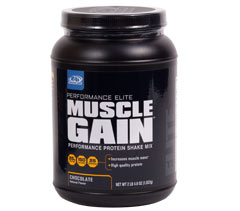 This is a personal favorite of mine with Twenty-Five grams of metabolically balanced protein that feeds your muscles the amino acids and other components essential for protein synthesis and muscle building.
This is a personal favorite of mine with Twenty-Five grams of metabolically balanced protein that feeds your muscles the amino acids and other components essential for protein synthesis and muscle building.
Muscle Gain™ contains three types of protein (whey protein concentrate, calcium caseinate, and milk protein concentrate) which digest at different rates, giving you a great tasting shake mix that can help you refuel after exercise, between meals or added anytime you need a boost of extra protein to complement your diet. Considering muscles need much more than just protein for optimal function, Muscle Gain adds important vitamins and minerals such as vitamin C, calcium and vitamin B-6 to give your body the balanced support it needs to help build muscle and maintain health and wellness.
- Contains 25 grams of high-grade, easily digestible protein per serving
- Provides nutritional support for increased lean muscle mass
- Helps maintain and restore energy supplies during and after physical activity
Meal Replacement Shakes
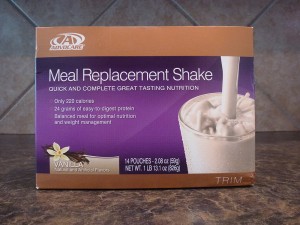 Delicious and portable shake mix that delivers a blend of protein, carbohydrates and fiber to keep you fueled and ready to tackle your day.
Delicious and portable shake mix that delivers a blend of protein, carbohydrates and fiber to keep you fueled and ready to tackle your day.
With 26 vitamins and minerals and 210-220 calories per serving, Meal Replacement Shakes are easy to digest and an excellent addition to your weight-management program.
Meal Replacement Shakes provide 24 grams of easy-to-digest protein and support the body’s ability to lower body fat when used as an alternative to high calorie foods. With a 1:1 protein-to-carbohydrate ratio, Meal Replacement Shakes support weight management and provides sustained energy for daily physical activity.
- Balanced meal for optimal nutrition and weight management
- 210-220 calories with 24 grams of easy-to-digest protein
- High in dietary fiber (5-6 grams)
- 26 vitamins and minerals
- 1:1 ratio of proteins to carbohydrates
Nutrition Tips for Athletes
By Peter Jaret and Reviewed by Brunilda Nazario, MD
Most of us who jog for an hour, take an aerobics class, or go to the gym don’t need to worry about a special diet for athletic performance. The basic guidelines for healthy eating provide all the energy and nutrition we need for our workouts. But if you push yourself hard for 90 minutes or more — especially if you compete in high-intensity endurance events — your diet can help you perform at your peak and recover more quickly afterwards. Here are five key tips for athletes to consider:
1. Load Up on Carbohydrates
Carbohydrates are an athlete’s main fuel. They are converted to glucose, a form of sugar, which is stored in muscles as glycogen. When you exercise, your body converts glycogen into energy. If you exercise for under 90 minutes, the stores of glycogen in your muscles are enough to fuel even high-intensity activity.
“For longer activities, carbohydrate loading for three or four days before an event can help top up your glycogen stores,” says Joy Dubost, RD, a spokesperson for the Academy of Nutrition and Dietetics.
- To achieve maximum carbohydrate storage, experts recommend eating a diet that gets about 70% of its calories from carbohydrates, including breads, cereals, pasta, fruit, and vegetables.
- On the day of a big event, you should eat your last meal three to four hours before exercising, to give your stomach time to empty.
- Avoid eating sugary or starchy foods within 30 minutes of starting an activity. The process of metabolizing carbohydrates uses water, which can hasten dehydration.
For activities lasting longer than 90 minutes, it’s important to replenish carbohydrates, minerals, and water during exercise. Experts suggest you eat a snack and drink fluid every 15 to 20 minutes. Refined carbohydrates (with sugar or flour) pass quickly into the bloodstream, where they fuel working muscles. Many athletes prefer sports bars, sports drinks, or gels, since they’re so convenient. But fruit or fruit juice are also excellent choices.
Replenishing carbohydrates is equally important after intensive exercise. “Since you don’t need quick energy, it’s best to choose less refined carbohydrates” such as a whole grain bagel or carrot and veggie sticks, which provide both carbohydrates and a rich array of nutrients, says Dubost.
2. Consume Enough — but Not Too Much — Protein
Protein does not provide a lot of fuel for energy, but it is important for maintaining muscle tissue.
- The average person needs about 1.2 to 1.4 grams of protein per kilogram of body weight a day. That’s about 88 grams of protein for a 150-pound person.
- A strength athlete may need up to 1.7 grams per kilogram of body weight. That’s about 150 grams of protein for a 200-pound athlete.
“Milk is one of the best foods for recovery after an event, because it provides a good balance of protein and carbohydrates,” says Dubost. Milk also contains both casein and whey protein. The combination may be particularly helpful for athletes. Research shows that whey protein is absorbed quickly, which can help speed recovery immediately after an event. Casein is digested more slowly, helping to ensure long-term recovery of muscle after a grueling event. Milk also contains calcium, which is important for maintaining strong bones.
Although protein is made up of amino acids, Dubost says there is little evidence that taking specific amino acid supplements offers an advantage. What’s more, consuming too much protein can put a strain on your kidneys. Instead of supplements, she suggests eating high-quality protein, such as lean meats, fish, poultry, nuts, eggs, or milk.
3. Go Easy on Fat
For long events, such as marathons, the body turns to fat for energy when carbohydrate sources run low. But most athletes get all the fat they need by following basic dietary guidelines: Eat mostly unsaturated fat from foods such as nuts, avocados, olives, vegetable oils, and fatty fish such as salmon and tuna. Experts recommend avoiding fatty foods on the day of an event, since they can cause stomach distress for some people.
4. Drink Fluids Early and Often
High-intensity exercise, especially in hot weather, can quickly leave you dehydrated. Dehydration, in turn, can hurt your performance and, in extreme cases, be life-threatening.
“All high-intensity athletes should drink fluids early and often,” says Dubost. “And don’t wait until you’re thirsty. By the time you feel parched, you may be seriously dehydrated.”
“One way to monitor hydration is to keep an eye on the color of your urine,” says Joshua Evans, MD, a physician at Children’s Hospital of Michigan in Detroit and an expert on dehydration.
A pale yellow color means you’re getting enough fluid. Bright yellow or dark urine means you’re falling short.
Because intense exercise causes rapid fluid loss, it’s a good idea to drink fluids before as well as during an event, says Dubost.
- For endurance athletes such as marathon runners or long-distance cyclists, experts recommend drinking 8 to 12 ounces of fluid every 10 or 15 minutes during an event.
- When possible, drink chilled fluids, which are more easily absorbed than room temperature water. Chilled fluids also help cool your body down.
5. Replenish Lost Electrolytes
Sweating causes both fluid and electrolyte loss. Electrolytes help transmit nerve signals in your body, and play many other important roles. To replenish lost electrolytes, many athletes reach for sports drinks. If you lose a lot of fluid sweating, experts recommend diluting sports drinks with equal amounts of water to get the best balance of fluid and electrolytes

